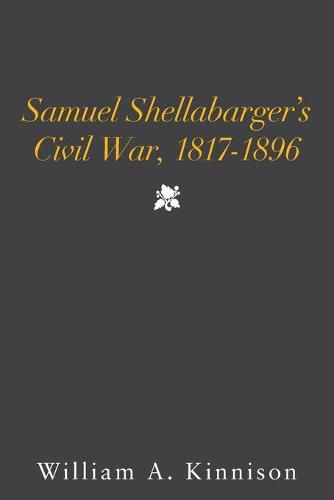Readings Newsletter
Become a Readings Member to make your shopping experience even easier.
Sign in or sign up for free!
You’re not far away from qualifying for FREE standard shipping within Australia
You’ve qualified for FREE standard shipping within Australia
The cart is loading…






This title is printed to order. This book may have been self-published. If so, we cannot guarantee the quality of the content. In the main most books will have gone through the editing process however some may not. We therefore suggest that you be aware of this before ordering this book. If in doubt check either the author or publisher’s details as we are unable to accept any returns unless they are faulty. Please contact us if you have any questions.
On Mud Run, near the recently abandoned Shawnee Indian village of Pickewe, Samuel Shellabarger was born in a log cabin on December 10, 1817. It was in the middle of an endless Ohio forest, a world away from civilization. Indians said a bird could fly from the Ohio River to Lake Erie never having to land on the ground. Mud Run was so deep into the forest that it seemed unlikely that anyone lost there could in a single lifetime win national fame and fortune. There were clues in Samuel Shellabargers early years that suggest he might surely rise above this wilderness. Shellabargers inspiration for a new America was a religious belief that God had created of one blood all the peoples of the earth and all were equal in God’s sight, whether he or his father wanted it to be so or not. The nation, he believed, for its own sake, should embrace equality before the law or dire consequences would result. The nation’s founders had declared that all men were equal but failed to achieve equality in practice. His generation was called upon to correct the mistake. But they let the opportunity slip from their grasp and created instead a new America he described as, not fit to be. Samuel Shellabarger did not become famous, though he almost did. He became instead a footnote in a forgotten story that the nation should have remembered. And America, he believed, missed the only chance it might ever have to preserve democracy in the nation.
$9.00 standard shipping within Australia
FREE standard shipping within Australia for orders over $100.00
Express & International shipping calculated at checkout
This title is printed to order. This book may have been self-published. If so, we cannot guarantee the quality of the content. In the main most books will have gone through the editing process however some may not. We therefore suggest that you be aware of this before ordering this book. If in doubt check either the author or publisher’s details as we are unable to accept any returns unless they are faulty. Please contact us if you have any questions.
On Mud Run, near the recently abandoned Shawnee Indian village of Pickewe, Samuel Shellabarger was born in a log cabin on December 10, 1817. It was in the middle of an endless Ohio forest, a world away from civilization. Indians said a bird could fly from the Ohio River to Lake Erie never having to land on the ground. Mud Run was so deep into the forest that it seemed unlikely that anyone lost there could in a single lifetime win national fame and fortune. There were clues in Samuel Shellabargers early years that suggest he might surely rise above this wilderness. Shellabargers inspiration for a new America was a religious belief that God had created of one blood all the peoples of the earth and all were equal in God’s sight, whether he or his father wanted it to be so or not. The nation, he believed, for its own sake, should embrace equality before the law or dire consequences would result. The nation’s founders had declared that all men were equal but failed to achieve equality in practice. His generation was called upon to correct the mistake. But they let the opportunity slip from their grasp and created instead a new America he described as, not fit to be. Samuel Shellabarger did not become famous, though he almost did. He became instead a footnote in a forgotten story that the nation should have remembered. And America, he believed, missed the only chance it might ever have to preserve democracy in the nation.